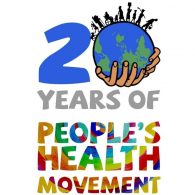Pandemics and Access to Healthcare Technologies: From an Intersectional, Gender and Equity Lens
A Call for Action
Initiative by Gender, Justice and Health Thematic Group of PHM & Sama Resource Group For Women & Health
Gender equality and women’s rights are central to Universal Health Care (UHC). To leave no-one behind, the UHC approach addresses gender-related determinants of health and through recognition of intersecting forms of discrimination that result in barriers to the full enjoyment of the right to health. The approach to UHC includes strengthening of health systems including financial, access to full range of affordable, quality health services along with addressing broader social determinants of health and structural factors such as cultural, socio-economic, geo-political, and legal environments.
COVID-19 pandemic has merely laid bare the global inequalities in accessing affordable, decent and equitable health care that disproportionately impacts women, trans people, persons with disability, vulnerable and other marginalized groups. The repercussions of this pandemic have been catastrophic, with women not only losing jobs but also not being able to return to work; girls being left out of education and pushed towards early and forced marriage; women’s share of unpaid care work growing drastically (link); frontline health care workers, who are predominantly women, facing discrimination and exploitation; and the health and well-being of women and oppressed genders being compromised due to the reallocation of resources and priorities, including but not limited to sexual and reproductive health services. Trans persons have lost means of income and a range of factors contribute to them not being able to access government support at such a time (link). The situation across the globe remains grim as the gap to achieve gender equality grew by an additional 36 years in a span of 12 months because of the direct impact of the pandemic on women! (link)
Even as the discourse on inequality has garnered visibility, the response to the pandemic has not embedded a gender lens that accounts for the unique needs, responsibilities and perspective of women, trans people, and other vulnerable groups. On the contrary, big pharma, corporations, and individuals are increasing their wealth by driving commercialization of healthcare and an unjust patent regime that has adverse effects on these groups. Increasing use of digital technologies despite its best intentions, without factoring who has accessibility and control over these resources, has only added a layer to existing inequalities with additional threat of surveillance. The pandemic has also seen a trend of increasing authoritarianism and repression by governments across the world with the overwhelming brunt being faced by vulnerable groups such as women and oppressed genders.
The pandemic has reinforced the need to find solutions at the intersection of public health, gender, and various other forms of marginalization. The need of the hour is to consolidate our efforts to ensure equitable access to healthcare across the globe by re-thinking and re-drawing health policy and responses that are not based on patriarchal, racist, and ableist thinking.
There is, thus, an urgent and critical need for a gender framework to analyze vaccines and other healthcare technologies. Moreover, a feminist praxis approach to build conversations on vaccines would also underline the redistribution of power in the ‘given’ policy discourses – including health research and decision-making processes, public health and its implementation. The exacerbated injustices and crisis in the COVID-19 context have rightly compelled us to realise the political aspects of all the institutions governing our countries, societies, regions, and overall lives. This, for certain, has also reiterated the political weavings surrounding science in what we witness today – how in science or the larger health research, innovations have remained controlled, leading to articulations or projections that may not necessarily reflect the interests of public welfare or health and human rights of the people, especially the ones who remain marginalized.
While the current debate looms largely over vaccines, there is a need to go beyond the vaccine debate and put equal emphasis on access to other health care services and technologies and social determinants of health through a critical and holistic lens. Our efforts should align to adopt an approach that sees multiple or intersecting inequalities, such as gender, caste, indigeneity, race, religion, gender, gender expression, sexual orientation, disability, age, occupation/work, geographical location, nationality or citizenship, or any other social, economic, cultural or political characteristics which influences access and decision-making to critical health services and information about COVID-19. The fulfillment of the right to health includes, but is not limited to, the realization of the right to free and accessible healthcare including emergency healthcare services, essential medications, vaccines, and sexual and reproductive healthcare services.
Gender Justice and Health Thematic Group of PHM and Sama have initiated the conversations around pandemics and public health through a gender and intersectionality lens to unpack pandemics, public health knowledge, care and technology, including access to diagnostic, vaccines, therapeutics. You can read about them here.
PHM joined webinars and consultations organised by Sama on developing a feminist framework that recognizes how policy and political processes are interconnected, and how policy responses are affected by cross-cutting issues such as the climate crisis, neoliberal politics, increased authoritarianism, and rapid expansion of the digitalization of work. There was considerable enthusiasm among meeting participants to be a part of this initiative.
We would like to call the PHM Gender, Justice and Health thematic group members and the members from PHM country circles, PHM regional chapters, to join the initiative which aims to –
1) create a focused global campaign to address response to pandemics and access to healthcare technologies from a gender and intersectionality approach;
2) create spaces to share experiences, research, evidence towards collective campaign strategies at the regional level, particularly in Global South (global south is a concept) and LMIC countries;
3) and create an opportunity to share knowledge resources and build global solidarities.
We would like to invite all of you to be a part of this initiative, shape it, and strengthen it towards an equitable and justiciable system that includes access to health care services such as PPEs, masks, oxygen, vaccines, and health determinants without any discrimination during and beyond the pandemic is possible.
Please share your contact details in the google form shared below along with any material, webinars, podcasts, films, posters you have developed in your region on these issues. We will be developing a page of Beyond 365 days-repository dedicated to this topic.
Sarojini N, Deepika Joshi and Neelanjana Das
Gender Justice and Health Thematic Group of PHM and Sama Resource Group for Women and Health


